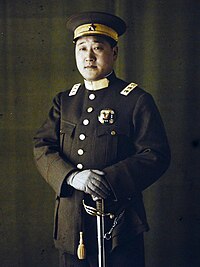Xu Shuzheng
Xu Shuzheng | |
|---|---|
Từ thụ tranh | |
 Autochromeportrait by Georges Chevalier, 1925. Xu is wearing the Order of Rank and Merit. | |
| Personal details | |
| Born | 11 November 1880 Xiao County,Jiangsu,Qing dynasty |
| Died | 30 December 1925(aged 45) Peking,Republic of China |
| Nationality | Chinese |
| Political party | Anhui clique |
| Alma mater | Imperial Japanese Army Academy |
| Occupation | Military officer |
| Awards | Order of Rank and Merit Order of the Precious Brilliant Golden Grain Order of Wen-Hu Order of the Sacred Treasure |
| Military service | |
| Allegiance | |
| Branch/service | |
| Rank | General |
| Battles/wars | Occupation of Mongolia |
Hsu Seu-ChengorXu Shuzheng(traditional Chinese:Từ thụ tranh;simplified Chinese:Từ thụ tranh;pinyin:Xú Shùzhēng;Wade–Giles:Hsü Shu-Cheng;IPA:[ɕúʂùt͡ʂə̄ŋ]) (11 November 1880 – 29 December 1925) was a ChinesewarlordinRepublican China.A subordinate and right-hand man ofDuan Qirui,[1]he was a prominent member of theAnhui clique.[2][3]
Early life[edit]
Xu was born inXiao County,Jiangsu(now part ofAnhuiprovince), with ascholar familybackground. He was one of the youngest persons ever to pass theImperial examinations.In 1905 he was accepted into the Japanese School of Land Army Officials, and returned to China in 1910. From 1911 to 1917 he served in the First Army in various positions on the general staff, such as chief of the Logistics Department, deputy chief of land forces and chief of land forces. In 1914 he founded a middle school called Cheng Da Middle School, which is the predecessor of today's Affiliated High School of the Capital Normal College.
In 1918 Xu founded theAnfu Club,the political arm of theAnhui clique,which then won three-fourths of the seats in theNational Assembly.Later that year Xu executedLu Jianzhangafter discovering that Lu was trying to persuadeFeng Yuxiang,Lu's nephew, to fight against the Anhui clique. This would lead to Xu's own assassination in 1925.
Military career[edit]

In 1919 Xu assumed command of the Northwest Frontier Defense Army, whichinvadednewly independentOuter Mongoliain October. On November 17 he forced Outer Mongolia to withdraw its declaration of autonomy, thus temporarily bringing Mongolia back under Chinese control.[4]In 1920, after Duan fell from power, Xu lost his position and moved his forces back to confront his enemies. He was replaced in Mongolia by Chen Yi, and Mongolia became independent again in early 1921 when Chinese forces were defeated by the Russian–Mongol army commanded by General BaronRoman von Ungern-Sternberg.[5]Xu's forces were defeated in the subsequentZhili–Anhui Warand he was forced to take shelter in the Japanese embassy.

In the early 1920s, Xu was sent to Italy as part of a Chinese diplomatic mission; a secondary purpose was to get him out of the country. He returned to China in 1924 after Duan's return as chief executive.
Death[edit]
In December 1925, while traveling from Beijing to Shanghai by train, Xu was kidnapped byZhang Zhijiang,a member ofFeng Yuxiang's forces. He was assassinated at dawn the next day by Feng as revenge for the killing ofLu Jianzhang.This also deprived Feng's rival Duan of a powerful supporter. Xu was 45 years old.
Personal life[edit]

Xu had one wife and four concubines. His wife Xia Hongjun (Hạ hồng quân,also named Xia Xuan (Hạ huyên)), died in Suzhou, Jiangsu Province, in 1955. They had four sons and two daughters. First son Hsu Shen-chiao (Từ thẩm giaoXu Shenjiao) and third sonHsu Dau-lin(Từ đạo lân,Xu Daolin) were active inRepublic of Chinapolitics. Hsu Dau-lin wrote a biography, published in Chinese in 1962, entitledThe Life of General Hsu Shu-tseng.[6]Older daughter Hsu Ying Li (Từ anhXu Ying, also named Xu Yinghuan (Từ anh hoàn)), wrote a biography of her mother and married the linguistFang-Kuei Li.The other three died in childhood.
The four concubines were Shen Dinglan (Thẩm định lan), Shen Shupei (Thẩm thục bội,younger sister of Shen Dinglan), Wang Huicheng (Vương tuệ thành) and Ping Fangchun (Bình phương xuân). Xu had two daughters (Xu Pei (Từ bội) and Xu Lan (Từ lan)) with Shen Shupei, and two daughters (Xu Mei (Từ mỹ) and Xu Hui (Từ tuệ)) with Wang Huicheng.
Awards and decorations[edit]
- Order of Rank and Merit(China)
- Order of the Precious Brilliant Golden Grain(China)
- Order of Wen-Hu(China)
- Order of the Sacred Treasure(Japan)
Sources[edit]
- Trần hiền khánh (Chen Xianqing),Dân quốc quân phiệt phái hệ đàm (The Republic of China Warlord Cliques Discussed),2007 revised edition
- Edward A. McCord,The Power of the Gun: the Emergence of Modern Chinese Warlordism,Berkeley, University of California Press, 1993
- Arthur Waldron,From War to Nationalism,Cambridge, Cambridge University Press, 1995
See also[edit]
References[edit]
- ^"Xu Shuzheng and the Meeting of Military Governors at Tienjin"(PDF).Retrieved2010-03-02.[dead link]
- ^"The Event of Qinhuangdao and the Entrance of the Fengtian Clique into Shanhaiguan in 1918— The Cooperation between the Anhui Clique and the Fengtian Clique"(PDF)(in Chinese and English).Retrieved2010-03-02.[permanent dead link]
- ^The Literature of Travel in the Japanese Rediscovery of China: 1862–1945.Stanford University Press. March 1996. pp. 239–.ISBN978-0-8047-6478-0.
- ^"Exploring Chinese History:: Politics:: International Relations..."Retrieved2010-03-02.
- ^"Mongolian Independence Day".Retrieved2010-03-02.
- ^Hsu Dau-lin. 1962.The Life of General Hsu Shu-tseng.[In Chinese] Taipei: Commercial Press. 331 pp.
